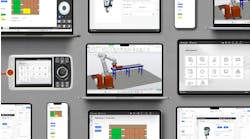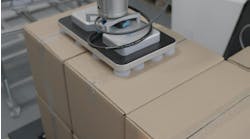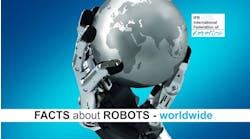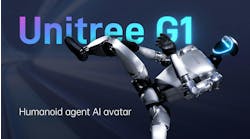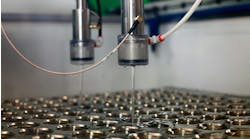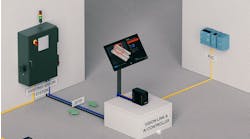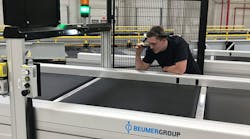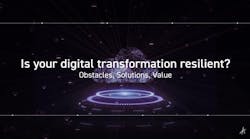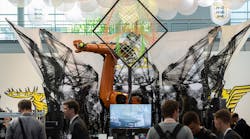Latest from Industry Trends
Digital transformation is inevitable. Industry, economy, and society are already there. How can a medium-sized mechanical engineering company and leading global systems supplier of intralogistics solutions face these changes and get the most value out of it?
Johannes Stemmer, Director of Digital Transformation at BEUMER Group, is here to give us answers.
Mr. Stemmer, how do you understand digital transformation within the context of your company?
Stemmer: It basically comes down to the safeguarding of our future sustainability. We are combining 80 years of experience, which made us one of the leading global systems suppliers in the intralogistics industry, with innovation that is driven by today's challenges from digitization.
What is important for a successful digital transformation?
Stemmer: We are already experiencing a digital transformation, not only in our business but also in our private lives. Almost everybody owns a smartphone, streaming services are taking over and digital platforms are continuously growing. Many of the companies that are active in this field have no relation to standard business models which have existed previously.
In August this year, Apple became the first company in the world to have a net worth of more than one trillion US dollars. That is more than the 15 largest DAX-listed companies combined.
This switch to mobile end devices also affects the buying behavior in our society. E-commerce is picking up speed, and we are expecting double-digit growth per year in this area. It is an important business field for BEUMER Group. We have to be fast and flexible in adapting to new technologies.
Property rights are an important topic that we will need to examine thoroughly. A traditional technical innovation can be patented, but when it comes to software, things get a little more difficult, and for business models, it becomes almost impossible.
For any digital innovation, data plays an increasingly important role. Their value tends to be underestimated in the industrial context. Data, and the resulting efficiency gains, are beneficial for customers and companies and the use of this data can be transferred into new business models. In this regard, other countries are way ahead of us, which has to make us rethink our strategy.
Where is Germany in this process at the moment?
Stemmer: I think that German companies are generally in a better position than it is often portrayed in the media. We have many hidden champions who are global leaders with their products and systems. That is a very good starting position to acquire the necessary digital literacy needed to ensure future sustainability.
In my opinion, it is easier for a company to adopt digitization technologies instead of trying to catch up on the know-how lead in the manufacturing sector from a software perspective.
The goal is to complement the capacity of the machines and systems, including the required software and controls, with digital innovation. Especially the B2B environment offers us every chance to play a leading role.
The name "digital transformation" already implies that there is an important change involved. What does this mean for the business world and for the individual, what will be the challenges?
Stemmer: First of all we have to include the people in this, at an acceptable pace. We at BEUMER Group have a large group of different experts.
Some of the colleagues work on innovation and software every day, other areas are less affected by this. It is important to make all employees more aware of this topic.
Digital transformation is inevitable and it will change our entire business environment. So we should avoid alarmism and find quick and consistent answers instead.
How can you make people more aware of this topic?
Stemmer: One good example is streaming services. Everybody knows Spotify, Apple Music or Netflix.
What is new is that we have to look at them as our competitors. Not because they offer the traditional products in the intralogistics field as we do, but because streaming services have changed the entire market mechanisms.
Our sortation systems were used for sorting and distributing CDs for the music industry, for example. Within only a few months this entire market was canceled out, almost no one went to a record store anymore because now there were streaming services.
With these business models, the services contributed, within a very short period of time, to the disruption of a market segment that we are active in. This can happen in other segments too.
What are the reactions among the employees?
Stemmer: They can see that there is a lot happening right now. They also see the opportunities, if we respond quickly and efficiently. We can't just ignore the changes.
BEUMER Group's core lies in plant engineering. In the past, we focused primarily on physical products and their automation, like a packaging system, a sorter or a belt conveyor. That is our expertise. But over the course of the last few years, software became increasingly important, so we are now employing more than 200 software engineers in our group. This trend will only continue.
How can this transformation process play out? Are there different steps?
Stemmer: It would be naive to think that we could make this change happen at the push of a button. It is a process that will take several years: we need to prepare our company for the digital age and bring our employees on board. For this, we are launching several pilot projects that are aimed towards solving concrete customer problems, improving our processes, and targeting new business models with the help of digitization.
Depending on the success of the pilot phase, the lessons learned will be integrated and developed further in our processes, products, and services.
BEUMER Group wants to be a driver of digital change and launched two spin-off companies. Can you tell us a little bit about these teams and their fields of activity?
Stemmer: We started BG.evolution at the university location of Dortmund, with the intention to bring digital innovation from outside into the company. This means that the colleagues are working on a customer problem and develop so-called minimum viable products, prototypes that feature minimum equipment, and check, if applicable, their market potential up to marketability. This makes it easier for us to decide quickly whether a new technology will work for the concrete customer problem.
Let's take for example the use of smart glasses: if our colleagues on-site need support from other departments at the head offices, for example for a concrete error pattern or maintenance. Here the new technologies can help us to support our service technicians or the customer directly. This is what we are testing the video glasses for.
The advantages: with the glasses, the colleagues on site can continue to work hands-free and communicate with everybody involved. The goal of BG.evlution is to validate new technologies for concrete applications in cooperation with the customer.
The second spin-off is Beam GmbH in Berlin. With this autonomous company builder, we want to solve problems that are unique to the logistics industry in cooperation with start-up teams.
For this, we are planning on founding three start-ups per year and transferring them, consolidated under Beam, into a separate company. The goal is to open up new business fields in logistics.
One example is that the BEUMER logistics chain at airports ends at the baggage reclaim area. One idea could be to have the bags of frequent flyers or business travelers directly delivered to their hotel. This is not part of the BEUMER core competencies, but a very promising business segment.
A young company could accept that challenge and work autonomously on a solution. Our goal is to then successfully establish it on the market. Unlike in Dortmund, the aim in Berlin is to pitch the problem to entrepreneurs and get them interested in working on a solution. What we offer is start-up financing and access to our experts and customers. They get the chance to start their own company.
How do you meet the entrepreneurs?
Stemmer: We launched this process about a year ago at Factory Berlin, the biggest start-up campus in Germany. There is a lot of talent among the 1,500 to 2,000 entrepreneurs.
Our Managing Director there is Robert Bach, himself an experienced entrepreneur. In Berlin we are right in the heart of the start-up scene, can benefit from events, give presentations ourselves and arrange offline events to get people's attention.
Of course, we can also use that framework to advertise for BEUMER Group: Who are we? What is our goal? Who are we looking for and what can we offer young entrepreneurs? It is the perfect platform for us for networking and elevating visibility.
Who are the BEUMER employees in Dortmund and Berlin?
Stemmer: The team in Dortmund is led by Christopher Kirsch. He is an experienced IT specialist and used to work for research institutions and industry projects for many years.
Our goal in Dortmund is to bring more software and sensor technology expertise into our company. So we are always looking for new talent in areas like the Internet of Things (IoT), sensor technology, full-stack development, and UX design. All of which are relatively new job descriptions in the plant engineering sector.
Let me come back to the smart glasses: we don't only need the hardware in the form of the actual glasses, but they must also be connected and integrated into our existing BEUMER tool landscape. We also need experts that are familiar with the exact conditions on-site and can recognize typical error patterns, so that, by using the smart glasses, they can provide better service.
This is why Dortmund is working in close cooperation with the colleagues and customers at the head offices, while Berlin has a more autonomous character.
What are your responsibilities?
Stemmer: My task is to build a bridge between BG.evolution in Dortmund, Beam in Berlin, and BEUMER Group. I am responsible for BEUMER internal digitization projects as well as the management of BG.evolution.
I'm basically the interface between the colleagues in Dortmund, Berlin, and the BEUMER Group companies and I support and foster the mutual exchange.
I want to make our colleagues more aware of this topic, which is a big part of my job. Communication is probably the most important element when it comes to digital transformation.
How does the cooperation with Beckum work?
Stemmer: It works very well in general, and we also learn new things every day and try out new formats of cooperating. Several times a year, we organize "Pitch Days" at our locations in Denmark, Beckum, and the US, for example. We encourage our colleagues to bring in their own ideas and challenges from their everyday working life.
This takes place in a very relaxed atmosphere in the cafeteria. Our goal is to generate new input that we address internally in Dortmund and Berlin, if possible, and include the colleagues and idea providers in the validation process.
BEUMER Group works in different business segments, such as the Center of Competence (CoC) for Logistics and the CoC Airport. Here we participate in central meetings and present our topics, learn about new problems and challenges and ensure a continuous dialogue.
We want to keep our colleagues up-to-date and communicate transparently through various in-house events. They are a crucial key element for us. Because there is a legitimate interest in what we are doing and why.
We continue to learn every day what format works and what doesn't. For some projects, our colleagues from Beckum can also come to Berlin or Dortmund themselves.
